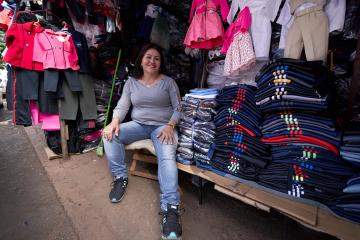
JOI Brazil’s first year promoting evidence generation and use within Brazilian labor markets

Increasing labor force participation of vulnerable populations can contribute to efficiently reducing poverty. By increasing employment and entrepreneurship, workers can generate income, expand their power of choice, and improve their quality of life. Among eighteen countries in the Latin American and Caribbean region, Brazil had the fifth highest unemployment rate for ages 15 to 24 in 2020.
However, the evidence to date shows mixed results on such approaches’ effectiveness at reducing poverty, and further evaluation is needed to understand the impacts of employment and entrepreneurship programs in real-world settings. The Jobs and Opportunity Initiative (JOI) in Brazil seeks to address this evidence gap by funding innovative and rigorous randomized evaluations in the country to understand the impact of different strategies on labor market conditions in Brazil.
In May 2021, J-PAL LAC, with support from Arymax Foundation, B3 Social, Potencia Ventures, Inter-American Development Bank, and Insper, launched the JOI Brazil as J-PAL’s first initiative in the country. The concomitance of the initiative’s first anniversary and the International Workers' Day this month marks an important opportunity to reflect on JOI Brazil's activities over the last year and its long-term strategy for improving labor market conditions in Brazil.
JOI Brazil has had many accomplishments within its first year—ranging from launching the initiative’s first funding competition, to starting a social incubation process, to disseminating evidence at policy events. Among these highlights, we are pleased to announce that Tide Setubal Foundation has joined JOI Brazil as a new partner organization.
Welcoming Tide Setubal Foundation
Since the beginning in May 2021, JOI Brazil has been generously supported by partnerships with five founding organizations that bring different, complementary points of view to make this a successful initiative. The inclusion of the Tide Setubal Foundation allows us to expand our activities in Brazil, build more partnerships, and fund additional randomized evaluations over the next four years.
Tide Setubal, a family foundation from Brazil, is dedicated to addressing socio-spatial inequalities. They will contribute to JOI Brazil’s work by supporting the identification and evaluation approaches that address the specific needs of communities who live on the periphery of urban areas and are often isolated from opportunities concentrated in cities.
Funding research across JOI Brazil’s four focus areas
The initiative’s most recent focus has been laying the groundwork for and launching JOI Brazil’s first funding competition with the academic leadership of three co-chairs, Marianne Bertrand, Claudio Ferraz, and Rodrigo Soares.
JOI Brazil will fund randomized evaluations within the initiative’s four main focus areas:
- labor supply and matching,
- job creation,
- future of jobs, and
- social issues and labor markets.
The initiative also funds research that addresses cross-cutting issues common within these four focus areas, including: gender, race, youth, soft skills, regional inequalities, green jobs, and job quality.
By supporting the generation of rigorous, real-world evidence, JOI Brazil aims to better understand the impact of strategies to get job seekers into the workforce, ease young people’s transitions into the working world, provide the skills entrepreneurs need to succeed, and help small businesses grow and innovate in Brazil.
In parallel, we constantly work on identifying Brazilian researchers, based either in the country or around the world, who are focused on labor markets evaluation and have important knowledge of the local context, to invite them to team with researchers from J-PAL’s network and apply for JOI Brazil funding. The collaboration of the selected candidates to J-PAL’s network contributes to building more rigorous evidence on promising social innovations in the labor sector in Brazil, with a keen eye to the particularities of local conditions, problems, and underlying causes.
Launching the social incubation process
In late 2021, we launched JOI Brazil’s first social incubation cycle with a webinar, attended by hundreds of professionals from the government, private, and non-profit sectors. Organizations, carrying out innovative work within at least one of JOI Brazil’s four focus areas, applied and were selected to participate in a capacity-building workshop where they learned how to produce and use rigorous evidence, and developed their own evaluation and monitoring plan.
The first social incubation process is now in its last step, in which the organizations will potentially collaborate with researchers from the J-PAL network to implement their evaluation plans. This innovative model, which combines training and academic matchmaking, aims to strengthen the culture of evidence-informed decision-making within the labor markets sector in Brazil.
Disseminating evidence to policymakers
As we build strong partnerships with program implementers, we look to deepen our efforts in promoting evidence-informed decision-making through labor markets policy events throughout the region. During JOI Brazil’s first year, we disseminated findings from global labor markets evidence at several events in the region.
For example, in November 2021, JOI Brazil’s manager Edivaldo Constantino discussed the literature on ethnic and racial discrimination in the labor market at an event hosted by the Secretariat of Labor, part of the Ministry of Labor and Social Security of Brazil. These occasions are important opportunities to promote evidence use, share results and policy lessons from randomized evaluations, and build new relationships with practitioners.
Looking forward
With the strong foundation of JOI Brazil’s first year, our goal is to expand the evidence on solutions to labor market challenges in Brazil.
In the upcoming months, the initiative will launch its second round of the social incubation process, in which we will work with a new group of organizations to increase the diversity of policies and programs evaluated in Brazil. We encourage program and policy supervisors who are dedicated to increasing the inclusion of people experiencing poverty in the Brazilian labor market to contact us at [email protected].
The initiative will also host seminars to promote evidence on subtopics within its four focus areas. The events will be open to the public, and project implementers interested in informing their policies and programs through rigorous evidence are especially welcome.
Finally, JOI Brazil will continue to facilitate connections between our network of researchers and practitioners who wish to evaluate their innovative programs so that new rigorous evidence can be generated in the country.
By raising awareness about evaluation and monitoring, and supporting rigorous evaluation of policies in real-world settings, JOI Brazil will be able to help identify effective innovations and collaborate with decision-makers to scale programs that benefit people experiencing poverty.
To stay up to date with research findings and related policy implications, subscribe to our mailing list and select “Labor Markets” as a sector interest area.




